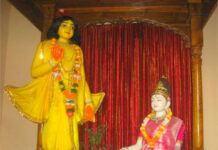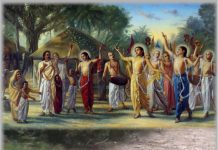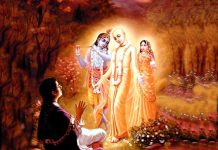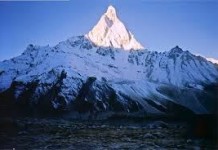
Continued from previous page… As far as vidya is concerned, the first mantra has explained very clearly that the Supreme Lord is the proprietor of everything and that forgetfulness of this fact is ignorance. The more a man forgets this fact of life, the more he is in darkness. In view of this, a godless civilization directed toward the so-called advancement of education is more dangerous than a civilization in which the masses of people are less “educated.”
Of the different classes of men—karmis, jnanis and yogis—the karmis are those who are engaged in the activities of sense gratification. In the modern civilization, 99.9 percent of the people are engaged in the activities of sense gratification under the flags of industrialism, economic development, altruism, political activism, and so on. All these activities are more or less based on satisfaction of the senses, to the exclusion of the kind of God consciousness described in the first mantra.
In the language of the Bhagavad-gita (7.15), people who are engaged in gross sense gratification are mudhas—asses. The ass is a symbol of stupidity. Those who simply engage in the profitless pursuit of sense gratification are worshiping avidya, according to Sri Isopanishad. And those who play the role of helping this sort of civilization in the name of educational advancement are actually doing more harm than those who are on the platform of gross sense gratification.
The advancement of learning by a godless people is as dangerous as a valuable jewel on the hood of a cobra. A cobra decorated with a valuable jewel is more dangerous than one not decorated. In the Hari-bhakti-sudhodaya (3.11.12), the advancement of education by a godless people is compared to decorations on a dead body. In India, as in many other countries, some people follow the custom of leading a procession with a decorated dead body for the pleasure of the lamenting relatives. In the same way, modern civilization is a patchwork of activities meant to cover the perpetual miseries of material existence.
All such activities are aimed toward sense gratification. But above the senses is the mind, and above the mind is the intelligence, and above the intelligence is the soul. Thus the aim of real education should be self-realization, realization of the spiritual values of the soul. Any education which does not lead to such realization must be considered avidya, or nescience. And to culture such nescience means to go down to the darkest region of ignorance.
According to the Bhagavad-gita (2.42, 7.15), mistaken mundane educators are known as veda-vada-rata and mayayapahrita-jnana. They may also be atheistic demons, the lowest of men. Those who are veda-vada-rata pose themselves as very learned in the Vedic literature, but unfortunately they are completely diverted from the purpose of the Vedas. In the Bhagavad-gita (15.15) it is said that the purpose of the Vedas is to know the Personality of Godhead, but these veda-vada-rata men are not at all interested in the Personality of Godhead. On the contrary, they are fascinated by such fruitive results as the attainment of heaven.
As stated in Mantra One, we should know that the Personality of Godhead is the proprietor of everything and that we must be satisfied with our allotted portions of the necessities of life. The purpose of all Vedic literature is to awaken this God consciousness in the forgetful living being, and this same purpose is presented in various ways in the different scriptures of the world for the understanding of a foolish mankind. Thus the ultimate purpose of all religions is to bring one back to Godhead.
But the veda-vada-rata people, instead of realizing that the purpose of the Vedas is to revive the forgetful soul’s lost relationship with the Personality of Godhead, take it for granted that such side issues as the attainment of heavenly pleasure for sense gratification—the lust for which causes their material bondage in the first place—are the ultimate end of the Vedas.
(To be continued to the next page…)
Source: Sri Isopanishad. Translation and purports by His Divine Grace A.C.Bhaktivedanta Swami Prabhupada. Copyright BBT International http://www.vedabase.com/en/iso





































